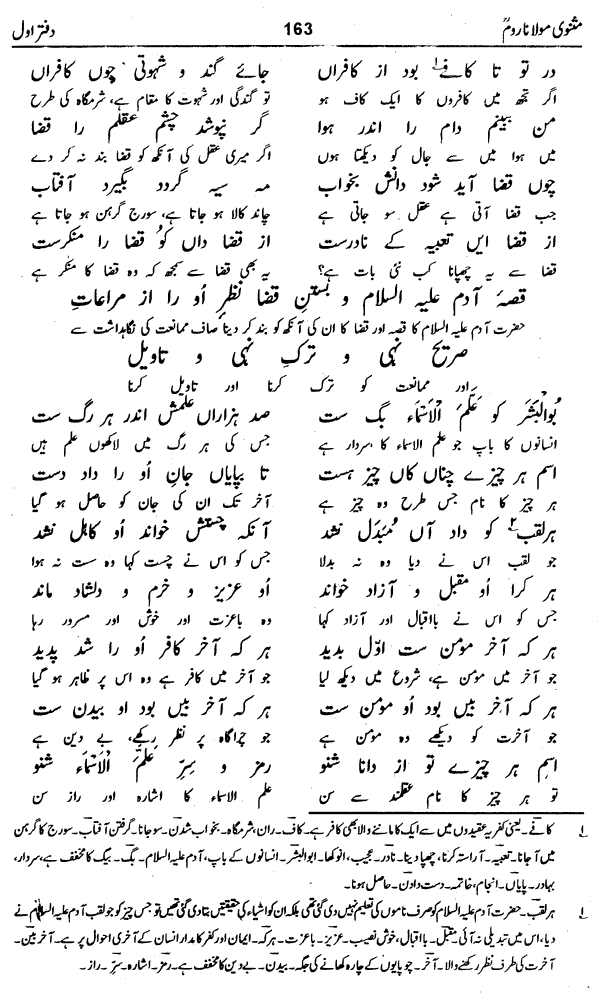Story of the hoopoe and Solomon, showing that when the Divine destiny comes to pass, clear eyes are sealed.
When the tent-pavilion was pitched for Solomon, the birds came before him to pay obeisance.
They found (him) speaking the same tongue (as themselves) and familiar with them: one by one they sped with (eager) soul into his presence. All the birds, having ceased from twittering, (in converse) with Solomon became more distinct (spoke more articulately) than your own brother.
1205. To speak the same tongue is a kinship and affinity: a man, (when he is) with those in whom he cannot confide, is like a prisoner in chains.
Oh, many are the Indians and Turks that speak the same tongue; oh, many the pair of Turks that are as strangers (to each other).
Therefore the tongue of mutual understanding is different indeed: to be one in heart is better than to be one in tongue.
Without speech and without sign or scroll, hundreds of thousands of interpreters arise from the heart.
The birds, all and each, their secrets of skill and knowledge and practice
1210. Were revealing, one by one, to Solomon, and were praising themselves by way of submitting a request (for his consideration),
Not from pride and self-conceit, (but) in order that he might give them access to him.
When a captive wants a lord (to buy him as a slave), he offers a preface (summary account) of his talent;
(But) when he is ashamed (disgusted) at his buying him, he makes himself out to be sick and palsied and deaf and lame.
The turn came for the hoopoe and his craft and the explanation of his skill and thoughtfulness.
1215. “O king,” said he, “I will declare (only) one talent, which is an inferior one; ’tis better to speak briefly.”
“Tell on,” said Solomon; “let me hear what talent that is.” The hoopoe said, “At the time when I am at the zenith,
I gaze from the zenith with the eye of certainty and I see the water at the bottom of the earth,
So that (I know) where it is and what is its depth; what its colour is, whence it gushes forth—from clay or from rock.
O Solomon, for the sake of thine army's camping-place keep this wise one (beside thee) on thy expeditions.”
1220. Then said Solomon, “O good companion in waterless far-stretching wastes!”
How the crow impugned the claim of the hoopoe.
When the crow heard (this), from envy he came and said to Solomon, “He has spoken false and ill.
It is not respectful to speak in the king's presence, in particular (to utter) lying and absurd self-praise.
If he had always had this (keen) sight, how would not he have seen the snare beneath a handful of earth?
How would he have been caught in the snare? How would he have gone into the cage willy-nilly?”
1225. Then Solomon said: “O hoopoe, is it right that these dregs have risen from thee at the first cup?
O thou who hast drunk buttermilk, how dost thou pretend intoxication and brag in my presence and tell lies besides?”
The hoopoe's answer to the attack of the crow.
He said, “O king, for God's sake do not listen to the enemy's words against me, bare beggar as I am.
If this which I claim is not (true), I lay my head (before thee): sever this neck of mine.
The crow, who disbelieves in the (absolute) authority of the Divine destiny, is an infidel, though he have thousands of wits.
1230. Whilst there is in you a single k (derived) from the káfirán (infidels), you are the seat of stench and lust, velut rima femoris.
I see the snare (when I am) in the air, if the Divine destiny do not muffle the eye of my intelligence.
When the Divine destiny comes, wisdom goes to sleep, the moon becomes black, the sun is stopped (from shining).
How is this disposal (of things) by the Divine destiny (to be called) singular? Know that it is by the Divine destiny that he (the infidel) disbelieves in the Divine destiny.




1 comment:
Subhan Allah.
Post a Comment